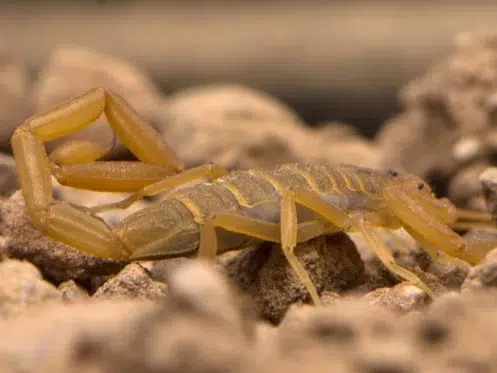Scorpions are a common concern for residents in Phoenix, Tucson, and other areas of the Sonoran Desert. With more than 50 species of scorpions found in Arizona, it’s natural to wonder if a dangerous scorpion could pose a life-threatening risk.
But is a scorpion sting fatal?
Let’s take a closer look at the risks and how to protect yourself from these arachnids.
Key Takeaways
- The Arizona Bark Scorpion is the most venomous scorpion in North America and can cause serious health problems.
- Most stings are not fatal, but young children, elderly people, and those with health issues face higher risks.
- Symptoms include severe pain, muscle twitching, trouble breathing, and in serious cases, medical care may be needed.
- Keeping scorpions away means sealing cracks, using UV lights, reducing insects, and getting help from pest control experts.
Are Scorpion Stings in Arizona Fatal?
Whether a scorpion sting in Arizona is fatal depends on factors like the species of scorpion. One species that poses the highest risk is the Arizona Bark Scorpion.
This arachnid is a small, light brown with pincers and a curved stinger. It is the most venomous type of scorpion in North America. Unlike other species in the Southwest, its venom contains neurotoxins that affect the nervous system and can cause severe symptoms in humans.
For healthy adults, its sting is extremely painful but rarely fatal.
However, it can be more severe than a bee sting for certain groups who are at a higher risk of life-threatening reactions, including young children, older adults, people with an allergic reaction to venom, and individuals with respiratory or heart conditions.
Symptoms of an Arizona Bark Scorpion Sting
The scorpion venom can cause a variety of symptoms, including:
- Severe pain and burning at the sting site
- Tingling or numbness that spreads to other areas
- Uncontrollable muscle twitching
- Difficulty breathing or swallowing
- Excessive drooling
- Abnormal eye movements
- Nausea and vomiting
These symptoms usually appear within minutes and can last several hours. In severe cases, a sting may require antivenom and medical treatment.
What to Do If You Get Stung
If you experience a scorpion sting, follow these steps:
- Stay calm – Panic can increase heart rate and spread the venom faster.
- Wash the sting site with soap and water.
- Apply a cool compress to reduce swelling and pain.
- Take pain relievers like ibuprofen or acetaminophen if needed.
- Call Poison Control (1-800-222-1222) for guidance.
If you have difficulty breathing, excessive muscle twitching, or loss of consciousness, seek medical attention immediately.
How to Prevent Scorpion Stings
These arthropods are nocturnal and often hide in crevices, woodpiles, or even inside homes. They are commonly found in Phoenix, Tucson, and even parts of New Mexico.
If you’re in high-risk areas, here’s how to prevent a scorpion problem and potential infestation:
- Seal entry points like cracks and gaps around doors, windows, and baseboards.
- Use a black light (UV light) at night to check for the glowing exoskeleton of scorpions.
- Declutter your home and yard to eliminate hiding spots.
- Shake out clothing, bedding, and shoes before use.
- Keep food sources in check by reducing populations of crickets, wasps, roaches, and other insects.
- Hire a pest control company for scorpion control and prevention.
Protect Your Home with Expert Scorpion Control
At Green Home Pest Control, we know how unsettling it can be to find scorpions in your home. While an Arizona Bark Scorpion sting is painful and potentially dangerous, fatalities are extremely rare. The best way to protect your family is by learning how to spot scorpions, taking preventative measures, and knowing what to do if you get stung.
If you’re dealing with a scorpion problem, our scorpion control services can help. We use effective, family-friendly treatments to eliminate scorpions and their food sources, keeping your home safe.
Contact us today for expert scorpion control in Phoenix, Tucson, and surrounding areas!




